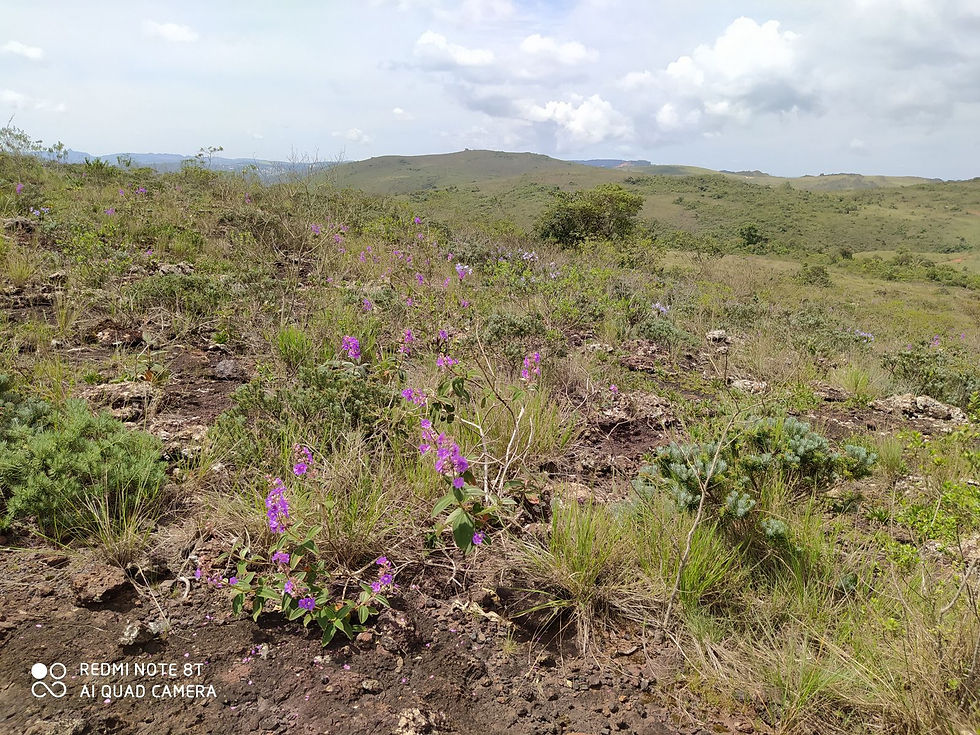Traits, remote sensing and climate vulnerability
- Kerry-Anne Grey
- Nov 7, 2024
- 3 min read
At the start of this Michaelmas term, the Ecosystems Programme welcomed back Dr Milton Barbosa and Dr Renata Maia to Dr Jesús Aguirre-Gutiérrez's Functional Biodiversity & Remote Sensing Lab in the Ecosystems Programme - Milton as a Marie Currie Research Fellow and Renata as a visiting Postdoctoral Researcher.
During his Marie Currie Research Fellowship with the Ecosystems Programme, Milton's research will focus on detecting and monitoring the resilience of tropical forests to climate change. Tropical forests are experiencing increases in temperatures and changes in rainfall patterns. These forests are highly vulnerable to these climate changes due to their sensitivity to temperature and water stress. Even slight shifts in climate can disrupt the delicate balance of their ecosystems and drive degradation of tropical forest vegetation.
Milton is exploring how functional traits in plants help these forests adapt to warming climates. Plant functional traits are specific characteristics of plants - such as leaf thickness, water use efficiency, and nutrient content - that influence their growth, survival and reproduction. By studying plant functional traits, ecologists can better understand plant strategies (resulting from combinations of specific plant functional traits) for resource use, resilience to stress, and contributions to ecosystem processes like nutrient cycling and carbon storage.
A recent field campaign by Drs Renata Maia and Milton Barbos to measure plant functional traits across an altitudinal gradient in Brazil.
By combining state-of-the-art drone and satellite technologies with ecological field data, Milton aims to uncover how tropical forests around the globe are responding to environmental changes through shifts in functional strategies. These shifts represent a dynamic interplay of traits influenced by various environmental factors. Integrating ecological theories of plant form and function with advanced remote sensing data, Milton will develop a scalable tool to track climate change caused shifts in these functional strategies, and in turn forest resilience and vulnerabilities, supporting conservation and climate adaptation efforts.
Also buidling towards a greater understanding of how plant functional traits come together to form plant functional stretegies, Renata's research aims to determine how plant functional traits have combined to form adaptive strategies in 13 plant species growing along a unique altitudinal gradient (from 800 to 1400 m above sea level) in Brazil. The vegetation across this gradient transitions from the Cerrado (tropical savanna) at lower altitudes upwards to the high-altitude, nutrient poor and extremely dry Campo Rupestre ("rupestrian grassland").
"Located in the Brazilian highlands, the Campo Rupestre ecosystem, though covering less than 1% of Brazil, harbours over 15% of its flora and endures extreme environmental conditions, with poor, shallow soils, high solar radiation, and a six-month dry season." - Dr Renata Maia
Here Renata is studying how plant communities, particularly species in the resilient Velloziaceae family, adapt to the harsh challenges along this altitudinal gradient. By analysing the biochemical, morphological, and physiological traits of both woody and herbaceous plants, Renata aims to understand how these traits optimize for environmental conditions and support alternative strategies like desiccation tolerance.
There is high plant species richness along Brazil's Cerrado-to-Campo-Rupestre altitudinal gradient.
Renata's research will increase our understanding of how plant functional strategies combine to allow species to persist in harsh environments and how these strategies may make species either resilient or vulnerable to chaning climate - increasing our ability to predict "winners" and "losers" under climate change. Scaling up from the plant level, Milton's tool to track functional strategy changes over time using remote sensing is a major advance in this field.
"This research will provide essential insights into forest conservation strategies and sustainable ecosystem management, contributing to global efforts in mitigating climate change impacts." - Dr Milton Barbosa
The Ecosystems Programme welcomes such novel and exciting projects and looks forward to Drs Milton and Renata advancing this important field of research.

All photographs provided by Dr Milton Barbosa and Dr Renata Maia.













Comments